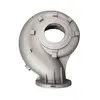Mobile:+86-311-808-126-83
Email:info@ydcastings.com
Design and Application of Industrial Impellers in Fluid Handling Systems for Enhanced Efficiency
Industrial Impellers The Heart of Fluid Motion
In the world of industrial fluid mechanics, impellers play a crucial role in the movement and management of liquids and gases. Often hailed as the heart of pumps, turbines, and various conveying systems, impellers are engineered to enhance the efficiency of fluid transport. Understanding the design and function of industrial impellers is essential for engineers and technicians aiming to improve operational workflows in manufacturing, chemical processing, and water treatment industries.
The Basics of Impeller Design
An impeller is a rotational component that transfers energy from a motor to a fluid. It is often made from materials such as stainless steel, bronze, or even plastic, depending on the application's requirements. Impellers feature blades that are meticulously designed to create a pressure difference in the fluid, drawing it into the impeller and pushing it outwards at high velocity.
The design of an impeller is influenced by several factors including the type of fluid being handled, the desired flow rate, and the required pressure. There are two primary types of impeller designs open and closed. Open impellers have blades that are exposed and are generally easier to clean and maintain. They are suitable for handling fluids with larger particles, such as slurries. Closed impellers, on the other hand, feature blades that are enclosed between two shrouds, making them better for high-pressure applications and for moving clean fluids.
The Importance of Impeller Performance
The performance of an impeller directly affects the efficiency of the entire system. A well-designed impeller can significantly reduce energy consumption, leading to cost savings for industries relying on fluid motion. Engineers often use computational fluid dynamics (CFD) to optimize impeller designs, simulating various conditions to achieve maximum performance.
industrial impeller

Performance metrics such as pump head, flow rate, and efficiency are critical in evaluating an impeller's effectiveness. The pump head refers to the height to which the impeller can raise the fluid, while flow rate indicates the volume of fluid that passes through the system in a given time. These parameters help determine whether an impeller is suitable for a specific application.
Applications of Industrial Impellers
Industrial impellers find applications in a variety of sectors, including water treatment, chemical processing, and energy production. In water treatment facilities, impellers are used in aeration tanks to mix air with water, promoting the growth of microorganisms that break down pollutants. In chemical plants, impellers are essential for mixing different substances to ensure uniformity in reactions.
In the energy sector, particularly in turbines, impellers are vital for converting fluid energy into mechanical energy. Gas turbines, for example, utilize impellers to compress air and mix it with fuel, facilitating efficient combustion and energy generation.
Future Trends and Innovations
As industries continue to prioritize efficiency and sustainability, the development of advanced impeller technologies is on the rise. Innovations such as 3D printing and the use of composite materials allow for more intricate designs, optimizing performance while reducing weight. Moreover, smart sensors can be integrated into impeller systems to monitor performance in real-time, enabling predictive maintenance and minimizing downtime.
In conclusion, industrial impellers are critical components in the realm of fluid dynamics. Their design influences the efficiency and performance of various systems, making them a focal point for innovation in industrial applications. As technology advances, the evolution of impellers will play a significant role in shaping the future of fluid transport and energy efficiency across multiple sectors.
-
Why Should You Invest in Superior Pump Castings for Your Equipment?NewsJun.09,2025
-
Unlock Performance Potential with Stainless Impellers and Aluminum End CapsNewsJun.09,2025
-
Revolutionize Your Machinery with Superior Cast Iron and Aluminum ComponentsNewsJun.09,2025
-
Revolutionize Fluid Dynamics with Premium Pump ComponentsNewsJun.09,2025
-
Optimizing Industrial Systems with Essential Valve ComponentsNewsJun.09,2025
-
Elevate Grid Efficiency with High-Precision Power CastingsNewsJun.09,2025











